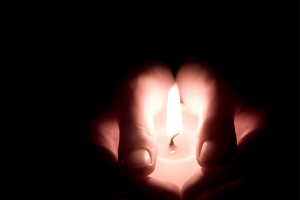My spiritual journey in OA started like a ship in a sea of confusion. How could I understand God’s plan for me, or take Steps Three and Eleven—surrender to, and maintain conscious contact with, God as I understood him—when I don’t believe that I, as a human, can understand God?
My ship visited many ports of discovery. In Port One, the man who is now my sponsor spoke at a face-to-face meeting. He said that a Higher Power could be anything: a sponsor, a rock, a chicken, these rooms . . . the point was that the Higher Power be something outside yourself, something you call and rely on to help you through your journey.
In Port Two, I had a conversation with my cousin, who has been in another Twelve Step program for years. I told him that despite expressing beliefs in many religions, I really felt like an agnostic and therefore couldn’t really understand God. He said, “Maybe believing that you can’t understand God is belief enough.”
In Port Three, I rested. I was meditating on something I read in an online OA forum when I realized: I don’t have to understand God to feel his love, any more than I have to understand the sun to feel its warmth. God’s love for me was reflected in the loving bond I shared with my mom, the first person in my life to make me understand what love is. Even though she’s gone, I believe her love is still with me.
Then I came to Port Four, the first time I ever “came ashore” to the Unconventional Spirituality telephone meeting. I heard so many things! One member said that Lakota Sioux people use the term “Wakan Tanka” to describe a Higher Power. It means “The Great Mystery.” A different member said that a Higher Power comes in whatever form is most useful to her. Another said she just puts the word out that she needs something and focuses on it; yet another member said that doubt is not wrong but an integral part of the faith process. I got more out of that meeting than I have time to repeat here, but I knew I’d found my home port.
Since then, I’ve visited other ports. In Port Internet, for example, I found on one website the history of agnosticism, and I learned that the person who coined the term meant it to be understood not as a belief, but as a process of learning. There, I also came to accept myself as an “agnostic theist,” a person who believes that God exists but also believes that God is unknowable, because the natures of God and man are by definition different—as that one member said, “Wakan Tanka,” a great mystery.
I’m an adventurer, a seeker by nature; I love to learn. I’m always ready to set sail again to expand my spiritual horizons. And I know that every Sunday at 10 a.m., I can always return to my spiritual home port.
—Denise, Maryland USA





